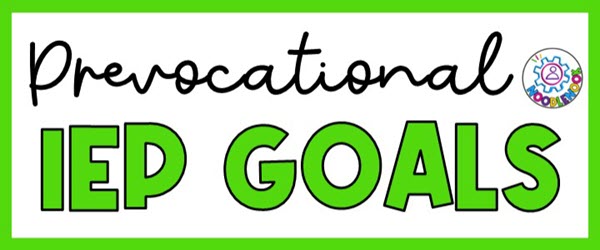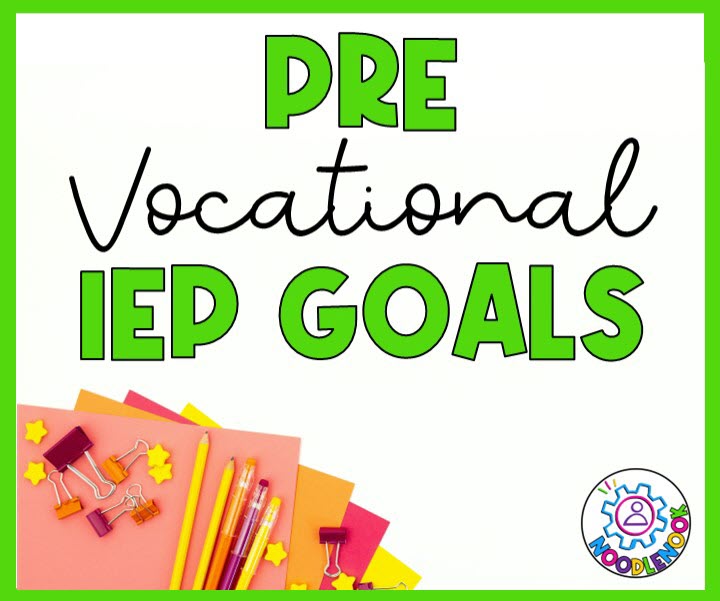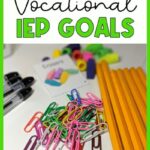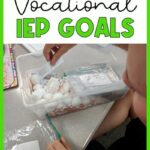In the world of special education, creating meaningful goals for students with special needs is essential for their success. In this blog post, we will explore how to create impactful goals in vocational goals and target life skills. Bookmark this page, because it is filled with pre vocational IEP goals in tons of specific areas and covers elementary and secondary students. Plus, there is a list of actionable tips for K-12 special education teachers. Let’s Go!
Understanding the Basics: IEP Goals and Transition Services
Let’s start by understanding the basics. An Individualized Education Program (IEP) goal statement should be measurable, attainable, and tailored to each student’s unique needs. The IEP team, which includes teachers, parents, and other professionals, plays a crucial role in setting goals that will help students transition smoothly to life after high school. When writing an IEP from as early as pre-kindergarten, the IEP team should be thinking of the student’s postsecondary goals. That means aligning specific academic goals and objectives with an important life skill that the child will need to be a successful adult.
Setting the Foundation: Present Level and Baseline Data
To lay the foundation for setting effective goals, begin by assessing each student’s current level. Collect baseline data to understand their strengths and challenges. This information will be the basis for creating realistic and beneficial IEP goals. You can look at a student’s complete works with a portfolio, do some solid teacher observations, or gather such information as employment, independent living, and education goals.
Drafting Measurable Annual Goals
The heart of any effective IEP is the measurable annual goal. As a special education teacher, you can create goals that focus on vocational and life skills within the context of classroom academics. For example, a goal could be, “By [IEP end date], when given an image prompt, the student will independently write a 5 word sentence.” This may be part of demonstrating improved writing skills, which supports this student’s postsecondary goals.
Pre Vocational and Life Skills
It’s important to prioritize essential life skills that will help students for independent living. Include goals related to telephone use, task initiation, and effective job skills. We also have a focus on academics, so when the two align, we’re golden. In lieu of that, loof for opportunities to draft a goal statement that supports academic progress but also reinforces life skills or pre vocational IEP goals.
Pre-Vocational IEP Goals (Ultimate Goal Inspo!)
Pre-vocational skills encompass a range of foundational skills that prepare students for future employment and independent living. Here are some common categories of pre-vocational skills:
Communication Skills:
Developing effective communication skills is crucial for vocational success. This includes verbal and nonverbal communication, active listening, following instructions, and expressing oneself clearly and appropriately.
Elementary Pre Vocational IEP Goals:
- Expressing Needs and Wants: Given a choice of two snacks, student will independently ask for their preferred choice 4 out of 5 times using complete sentences and eye contact by June 30th.
- Active Listening: When presented with a two-step instruction in the classroom, student will correctly complete both steps 3 out of 4 times without prompting by March 31st.
- Nonverbal Communication: During partner activities, student will demonstrate positive nonverbal communication (smiling, nodding, making eye contact) towards their partner at least 3 times per activity by May 31st.
Secondary Pre Vocational IEP Goals:
- Telephone Communication: When given a role-play scenario requiring a phone call, student will initiate the call, introduce themselves, state their purpose clearly, and ask relevant questions using polite language 3 out of 4 times by April 30th.
- Group Discussions: During small group discussions in class, student will actively participate by contributing at least 2 relevant comments or questions on the topic, demonstrating respect for others’ opinions, and staying on topic by June 15th.
- Job Interview Simulation: During a mock job interview, student will answer open-ended questions about their skills and experience confidently and professionally, maintaining eye contact and appropriate body language, with teacher assistance (e.g., prompts or reminders) no more than twice by December 15th.
Social Skills:
Interpersonal skills are essential for navigating the workplace and forming positive relationships with colleagues and supervisors. Social skills encompass skills such as teamwork, cooperation, conflict resolution, problem-solving, and professional etiquette.
Elementary Pre Vocational IEP Goals:
- Sharing and Cooperation: When playing with a partner in a structured activity (e.g., building blocks, puzzles), student will take turns using materials, offer their partner a chance to contribute ideas, and resolve any disagreements peacefully at least 3 out of 4 times by February 28th.
- Recognizing Personal Space: While lining up for lunch or classroom activities, student will maintain appropriate personal space (around an arm’s length) from others without prompting 4 out of 5 times by May 31st.
- Recognizing and Responding to Emotions: When a classmate displays visible signs of sadness or frustration, student will offer words of comfort or support at least twice during social interactions each week by June 15th.
Secondary Pre Vocational IEP Goals:
- Teamwork and Problem-Solving: During a group project, student will actively participate in assigning roles, contributing ideas, and working collaboratively to solve problems that arise, with minimal teacher intervention, by March 31st.
- Professional Email Etiquette: When composing an email to a teacher or other school staff member, student will use a formal tone, address the recipient correctly, express themselves clearly and concisely, and proofread for errors before sending, completing all steps independently by June 15th.
- Conflict Resolution: When faced with a disagreement with a peer in a classroom setting, student will calmly attempt to resolve the issue through respectful communication, compromise, and seeking adult assistance if necessary, demonstrating these skills at least 3 times during the semester without escalating the situation.
Time Management and Organization:
Preparing students for the demands of the workplace involves teaching them skills related to time management, punctuality, setting priorities, and organizing tasks and materials. These skills help students stay focused, meet deadlines, and complete their work efficiently.
Elementary Pre Vocational IEP Goals:
- Completing Tasks within Timeframes: Given a series of simple tasks in the classroom with pre-set time limits (e.g., finishing a worksheet in 10 minutes), student will complete 80% of tasks within the designated timeframes by June 30th.
- Prioritizing Activities: When presented with two or more activities to choose from, student will identify the most important one first and complete it before moving on to the others, demonstrating this behavior 3 out of 4 times by March 31st.
- Organizing Materials: Following instructions, student will independently tidy up their desk and return materials to designated storage areas at the end of each activity, maintaining this habit 4 out of 5 times by February 28th.
Secondary Pre Vocational IEP Goals:
- Creating and Following Schedules: With teacher guidance, student will develop a weekly schedule including school tasks, study time, extracurricular activities, and personal time, and follow it with 85% accuracy for two consecutive weeks by May 31st.
- Meeting Deadlines: When assigned a project with a specific due date, student will plan their work, break it down into manageable steps, and complete it on time without requiring extensions, achieving this 3 out of 4 times by December 15th.
- Minimizing Distractions: During independent study sessions, student will identify and avoid distractions (e.g., phone, social media) and utilize time management techniques (e.g., pomodoro method) to maintain focus for at least 45 minutes at a time, demonstrating this behavior 3 out of 4 times by June 15th.
Task Initiation and Follow-through:
Students need to develop the ability to initiate tasks independently and follow through on assigned responsibilities. This includes understanding work expectations, starting tasks promptly, managing time effectively, and persisting until tasks are completed.
Elementary Pre Vocational IEP Goals
- Starting Independently: When given a clear set of instructions for a new task, student will begin working without requiring prompting or reminders 3 out of 4 times by March 31st.
- Staying on Track: During independent work time, student will remain focused on their assigned task with minimal off-task behavior (e.g., talking, playing with materials) for at least 15 minutes at a time, increasing duration to 20 minutes by June 15th.
- Completing Tasks: Following initial prompting, student will independently complete simple tasks (e.g., cleaning up, finishing worksheets) to satisfaction without needing re-directed or needing to repeat steps, achieving this 4 out of 5 times by February 28th.
Secondary Pre Vocational IEP Goals
- Breaking Down Complex Tasks: With teacher guidance, student will break down large projects into smaller, manageable steps before starting, demonstrating this skill 3 out of 4 times for assigned projects by May 31st.
- Self-Monitoring and Progress Tracking: Student will utilize a checklist or timer to track their progress on tasks and adjust their time management as needed, demonstrating this behavior independently for at least two consecutive weeks by December 15th.
- Perseverance and Problem-solving: When encountering challenges during a task, student will persist in finding solutions independently or seek help proactively before giving up, demonstrating this behavior at least twice during each project throughout the semester.
Work Ethic and Responsibility:
Pre-vocational training should emphasize the importance of a strong work ethic and taking responsibility for one’s actions. This includes attributes such as dependability, reliability, accountability, and demonstrating a positive attitude towards work.
Elementary Pre Vocational IEP Goals
- Dependability: When assigned a classroom job or task, student will consistently complete it with care and effort, meeting expectations 4 out of 5 times by March 31st. 2. Positive
- Attitude: During group activities, student will contribute with enthusiasm and a willingness to help others, demonstrating this behavior at least twice per activity by June 15th. 3.
- Taking Ownership: When faced with a mistake or error in their work, student will calmly acknowledge it, accept responsibility, and actively seek solutions to correct it, demonstrating this behavior 3 out of 4 times by February 28th.
Secondary Pre Vocational IEP Goals
- Reliability: When given a deadline for a project or assignment, student will complete it by the due date without requiring extensions, achieving this 3 out of 4 times by December 15th.
- Self-Evaluation and Accountability: After completing a task, student will reflect on their performance, identify areas for improvement, and set goals for future projects, demonstrating this skill independently for at least two consecutive weeks by May 31st.
- Initiative and Teamwork: When working on a team project, student will actively participate, voice their ideas, and offer support to others, taking on additional responsibilities as needed, demonstrating these behaviors at least twice during group projects throughout the semester.
Problem-Solving and Critical Thinking:
Encouraging students to think critically and solve problems independently is crucial for vocational success. This involves teaching them to identify problems, analyze situations, consider alternative solutions, and make informed decisions.
Elementary Pre Vocational IEP Goals
- Identifying Problems: During classroom activities or play, student will independently point out a problem or discrepancy they encounter and suggest possible solutions 3 out of 4 times by May 31st.
- Making Choices: When presented with two or more options, student will analyze each option based on given information and make a reasoned choice, demonstrating this behavior 4 out of 5 times by March 31st.
- Simple Logic and Patterns: While completing puzzles or sorting activities, student will identify patterns and apply simple logic to solve problems or complete tasks independently, achieving this 3 out of 4 times by February 28th.
Secondary Pre Vocational IEP Goals
- Multiple Perspectives: When discussing a complex issue in class, student will demonstrate active listening and understanding of different viewpoints, contributing to the discussion by offering alternative solutions or considerations at least twice per discussion by June 15th.
- Analyzing Information: Given a real-world scenario or case study, student will effectively analyze relevant information, identify potential causes and effects, and propose evidence-based solutions, demonstrating this skill independently for at least one assigned project by December 15th.
- Decision-Making under Pressure: During role-playing activities simulating workplace situations, student will calmly analyze a presented problem, consider various options with potential consequences, and make a reasoned decision within a set timeframe, demonstrating this behavior 3 out of 4 times throughout the semester.
Self-Advocacy and Self-Determination:
Empowering students to advocate for their needs and make choices about their education and future careers is important. Students should learn to express their preferences, set goals, seek support when needed, and make informed decisions about their vocational paths.
Elementary Pre Vocational IEP Goals:
- Making Choices: During lunch, student will independently choose their preferred meal option or ask for assistance if needed, demonstrating this behavior 4 out of 5 times by May 31st.
- Expressing Needs: When feeling unwell or uncomfortable, student will clearly communicate their needs (e.g., needing a bathroom break, feeling dizzy) to a teacher or caregiver, achieving this 3 out of 4 times by March 31st.
- Setting Simple Goals: With teacher guidance, student will set a small, achievable goal for themselves (e.g., finishing a reading assignment) and track their progress, demonstrating this process at least twice during the semester by February 28th.
Secondary Pre Vocational IEP Goals:
- Self-Awareness and Skills Inventory: Student will create a personal list of strengths, interests, and learning styles, reflecting on this information to identify potential career paths or vocational training options, completing this activity independently by June 15th.
- Asking for Support: When encountering a challenge in class or during a project, student will actively seek help from a teacher, peer, or other support person, utilizing this strategy at least twice per semester without hesitation.
- IEP Participation: During individualized education plan (IEP) meetings, student will actively participate by asking questions, sharing their preferences, and contributing to goal-setting discussions, demonstrating this engagement at least once during the annual IEP review process.
Basic Math and Money Skills:
Proficiency in basic math skills, including money management, is essential for many vocational settings. Students should learn skills such as counting money, making change, budgeting, understanding financial transactions, and measuring quantities.
Elementary Pre Vocational IEP Goals:
- Counting Money: Identify and count coins and bills (up to $20) accurately and independently by May 31st.
- Making Change: Given a simple purchase scenario with a predetermined amount of money, student will calculate and provide correct change 3 out of 4 times by March 31st.
- Basic Budgeting: With teacher guidance, student will create a simple budget for a pretend trip to the store, allocating allowances and making choices within their budget constraints, demonstrating this activity at least twice during the semester by February 28th.
Secondary Pre Vocational IEP Goals:
- Financial Transactions: Understand and accurately interpret common financial transactions like receipts, bank statements, and paychecks, demonstrating this skill through individual tasks or real-world simulations by June 15th.
- Measurement and Estimation: Accurately measure common objects using basic units (e.g., inches, cups) and estimate quantities within a reasonable range (10%) during practical activities or projects, achieving this 3 out of 4 times throughout the semester.
- Budgeting and Saving: Develop a realistic monthly budget (with teacher guidance) including income, expenses, and savings goals, and track progress for at least one month, demonstrating this ability independently by December 15th.
These goals are specific, measurable, achievable, relevant, and time-bound, focusing on building basic math and money management skills crucial for various vocational settings. Remember to provide age-appropriate materials, hands-on activities, and real-world applications to help students solidify their understanding and gain confidence in handling money and basic math calculations.
Additional tips:
- Utilize technology like educational apps and games to reinforce learning in a fun and engaging way.
- Partner with local businesses or organizations for community-based learning opportunities.
- Encourage family involvement in discussing budgeting and responsible money management practices.
Technology Skills:
In today’s digital age, proficiency in technology is crucial. Students should develop skills in using computers, software applications, email, internet research, and other relevant technology tools commonly used in the workplace.
Elementary Pre Vocational IEP Goals:
- Keyboarding Basics: Demonstrate basic keyboarding skills by typing common words and short sentences with at least 90% accuracy by May 31st.
- Mouse Navigation: Independently navigate a computer screen using a mouse to click, drag, and scroll with accuracy and control by March 31st.
- Educational Software: Utilize age-appropriate educational software programs for specific learning tasks independently 3 out of 4 times by February 28th.
Secondary Pre Vocational IEP Goals:
- Email Communication: Compose and send professional emails with proper formatting, greetings, and clear communication by June 15th.
- Safe Internet Research: Independently identify and access reliable online sources for research projects, citing information correctly 3 out of 4 times by December 15th.
- Workplace Software: Demonstrate basic proficiency in commonly used workplace software applications (e.g., word processing, presentation software) through assigned tasks or projects by June 15th.
Bonus Goals:
- Computer Troubleshooting: Identify and solve basic computer issues like software glitches or internet connection problems with teacher guidance by May 31st.
- Creative Technology Tools: Learn and utilize basic digital tools for creative expression (e.g., drawing apps, photo editing software) at least twice during the semester.
- Digital Citizenship: Demonstrate responsible online behavior by respecting privacy, citing sources ethically, and avoiding plagiarism, incorporating these practices into all technology use.
Pre Vocational IEP Goals
These pre-vocational skill categories provide a foundation for students with special needs to develop the necessary competencies for successful employment and independent living. By incorporating these skill areas into IEP goals and providing targeted instruction and practice, special education teachers can support their students’ transition to the workforce.
Teacher Assistance and Classroom Support
Recognize the importance of teacher assistance in achieving these goals. Provide strategies that support special education teachers in helping students acquire necessary skills. For example, a goal could be, “With teacher assistance, the student will order items independently using an order form, showcasing improved writing and communication skills.”
Implementing Strategies for Skill Acquisition
Now that we have covered the basics of setting IEP goals, let’s discuss practical strategies for helping students acquire vocational and life skills:
- Explicit Instruction: Break down complex skills into smaller, manageable steps. Provide clear and explicit instructions, modeling the desired behavior or task. Offer opportunities for guided practice and gradually fade support as the student becomes more independent.
- Visual Supports: Utilize visual aids such as schedules, checklists, and visual prompts to support comprehension and task completion. Visual supports can help students better understand expectations and reinforce the sequence of steps involved in a task.
- Task Analysis: Analyze vocational and life skills tasks into smaller components. Identify the specific skills needed to complete the task successfully. Teach each skill individually, gradually building towards the overall task. This approach allows students to grasp each skill before combining them into a larger task.
- Reinforcement and Rewards: Implement a system of positive reinforcement to motivate students and reinforce desired behaviors. Provide praise, rewards, or tokens for their efforts and achievements. Tailor the rewards to match the interests and preferences of each student to increase their engagement and motivation.
- Generalization: Help students transfer their skills to different settings and contexts. Provide opportunities for practice in various environments, such as community-based settings or simulated work environments. Encourage students to apply their skills outside of the classroom to reinforce their independence and confidence.
- Collaboration with Related Services: Collaborate with related service providers, such as speech therapists, occupational therapists, or vocational specialists. They can offer valuable insights and strategies to support students in specific areas of need, further enhancing the effectiveness of the IEP goals.
- Ongoing Progress Monitoring: Continuously monitor and assess students’ progress towards their goals. Collect data regularly to track their growth and adjust instruction as needed. This data will inform future goal-setting and help identify areas that require additional support or modifications.
By implementing these practical strategies, special education teachers can support their students in acquiring vocational and life skills, paving the way for their success in postsecondary life.
In preparing special education students for life after high school, focus on social skills and beyond. Foster effective communication, teamwork, and collaboration. Utilize resources that offer helpful information on important life skills.
RECAP: Pre Vocational IEP Goals
In conclusion, the key to effective IEP goals lies in finding a balance between the needs of special education students and the requirements of the postsecondary world. By integrating vocational and life skills into measurable annual goals, educators can truly make a difference in the lives of their students.
Remember, each IEP goal should be tailored to the individual, avoiding a one-size-fits-all approach. Stay informed, stay engaged, and witness the positive impact of well-crafted goals on the journey of special education students toward independence and success.
Get More IEP Goal Ideas
If you need more IEP goal banks to reference as you work on your caseload, check out these other posts:
- How to Write an IEP Goal – 4 Essential Elements
- Special Education: IEP at a Glance Printable (Easy Prep)
- List of Student Strengths and Weaknesses for an IEP
- IEP Transition Goal Bank
- Reading Comprehension IEP Goals
- Written Expression IEP Goals: Writing Goals in Special Ed
- Phonemic Awareness IEP Goals
- IEP Goals for Anxiety (What, Why, and How To in Special Ed)
- IEP Goals and Objectives for ADHD Students (with Examples)
- Behavior IEP Goals





